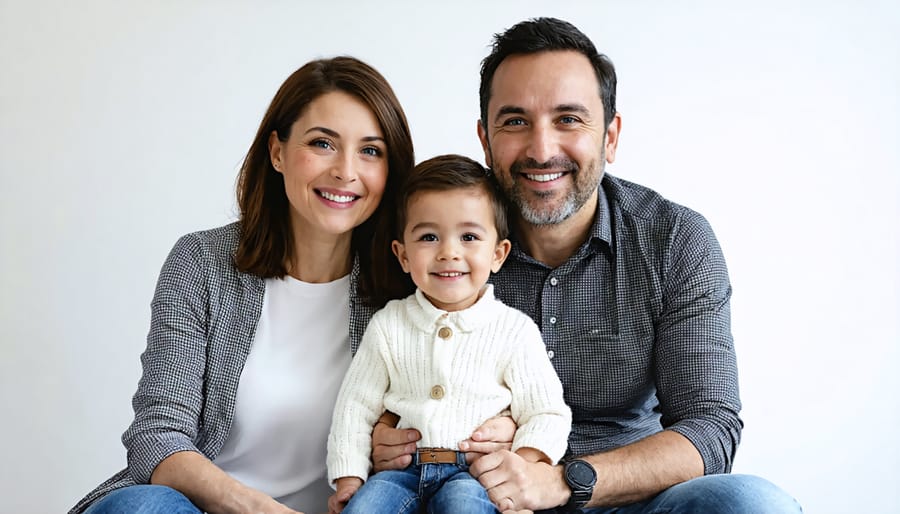Work together to provide a stable, nurturing environment that lets children feel safe expressing their emotions. Stay positive when discussing the other parent and avoid putting children in the middle. Focus on emotional resilience by modeling healthy coping skills, encouraging open communication, and seeking professional support if needed. Prioritize your children’s well-being by being flexible, compromising when necessary, and always considering their best interests first.
Maintain Consistent Routines and Rules
Consistency between households is crucial for providing children with a sense of stability and security during times of change. When co-parents maintain similar routines, rules, and expectations across both homes, it helps children feel grounded and reduces anxiety and confusion.
To get on the same page, start by openly discussing your parenting values and priorities. Identify areas of agreement and work to find compromises where you differ. Consider creating a shared parenting plan that outlines daily schedules, discipline strategies, and important lifestyle choices like screen time limits or bedtimes.
Presenting a united front also means keeping negative opinions about each other away from your children. Save disagreements for private discussions and avoid putting kids in the middle. If you’re struggling to see eye-to-eye, consider working with a mediator or parenting coordinator who can help you find solutions and maintain consistency for your children’s wellbeing.
Remember, while some variation between households is normal and okay, agreeing on the “big stuff” and sticking to predictable routines will help your children feel loved, supported, and secure. With time and practice, co-parenting consistency will become easier and more natural, fostering resilience in your kids.
Model Healthy Communication and Conflict Resolution
Healthy co-parenting after divorce/separation involves modeling respectful communication and problem-solving skills, even in the face of disagreements. When discussing issues related to the children, focus on active listening, using “I” statements, and finding common ground. Avoid criticizing or arguing in front of the kids. Instead, schedule regular check-ins to calmly discuss concerns and brainstorm solutions together.
When talking to children about the separation, use age-appropriate language and reassure them that both parents still love them. For younger kids, keep explanations simple and concrete, emphasizing that the divorce is not their fault. Older children may have more questions and concerns, so be open to ongoing discussions. Encourage them to express their feelings and validate their emotions. Consistency is key – work with your co-parent to establish similar routines, rules, and expectations across both households. By presenting a united front and prioritizing your children’s well-being, you can help them build resilience and adjust to the changes in their family structure.

Nurture Each Child’s Unique Strengths
In co-parenting, it’s essential for both parents to recognize and nurture each child’s unique strengths, abilities, and interests. By working together, co-parents can create a supportive environment that allows children to thrive and build resilience. For example, if one child excels in music while another has a passion for sports, both parents should encourage and facilitate these interests, regardless of whose home the child is in. This may involve coordinating schedules to ensure the child can attend music lessons or sports practices consistently.
Co-parents should also communicate openly about their children’s progress, challenges, and milestones. Regular check-ins or a shared journal can help keep both parents informed and involved in each child’s development. When parents present a united front in supporting their children’s individual growth, it provides a sense of stability and security that is crucial for building resilience.
Moreover, co-parents can work together to identify and address any specific needs or challenges each child may face. If one child struggles with anxiety, for instance, both parents can collaborate with healthcare professionals to implement consistent strategies and create a supportive home environment in both households. By approaching each child’s unique needs with empathy, understanding, and a shared commitment to their well-being, co-parents lay the foundation for resilience and long-term success.

Create a United Front for Emotional Support
Creating a united front as co-parents is essential for helping children navigate the complex emotions that come with family changes. Even if you have differences with your co-parent, it’s crucial to align on validating and supporting your children’s feelings. Acknowledge their emotions without judgment, and assure them that it’s normal and okay to feel sad, angry, or confused.
Work together to create a safe space for your kids to express themselves openly. Listen actively and empathetically, and avoid minimizing or dismissing their concerns. You might say something like, “I hear how much you miss having us all under one roof. It’s a big change, and it’s understandable to feel that way.”
Encourage your children to talk about their feelings through age-appropriate methods like drawing, writing, or playing. Brainstorm coping strategies together, such as deep breathing, physical activity, or spending quality time with each parent. Consistently remind your kids that both parents love and support them unconditionally.
If your children are struggling to open up or manage overwhelming emotions, consider enlisting the help of a child therapist who specializes in divorce and family transitions. Remember, the goal is to have a collaborative approach that prioritizes your children’s emotional well-being during this challenging time.
Prioritize Quality Time with Each Parent
Amidst busy schedules and shared custody arrangements, it’s crucial for children to have quality one-on-one time with each parent. Even if you only have a few hours together, make the most of it by giving your child your full attention. Put away phones and screens, and engage in activities your child enjoys, whether it’s playing a game, going for a walk, or simply talking about their day.
These focused interactions help your child feel loved, valued, and secure in their relationship with you. Consistency is key – try to establish regular rituals or traditions that your child can count on during your time together. If you’re struggling to find time for lengthy outings, remember that everyday moments like bedtime stories, car rides, or cooking together offer opportunities for bonding.
For parents with demanding work schedules, consider creative solutions like video chats, phone calls, or leaving surprise notes to stay connected when apart. Above all, prioritize being fully present and emotionally available during the time you do have. Your child will benefit immensely from knowing they have your undivided attention and unconditional love, even in the midst of challenging family circumstances.
Conclusion
In summary, co-parenting for resilience is a journey that requires commitment, communication, and a shared focus on your children’s wellbeing. By prioritizing your children’s needs, maintaining a respectful relationship with your co-parent, establishing consistent routines and boundaries, supporting your children’s emotional needs, and role modeling resilience, you can create a stable and nurturing environment that promotes your children’s mental health. Remember, building resilience is an ongoing process that involves nurturing the pillars of resilience over time. While co-parenting after separation or divorce can be challenging, your efforts to work together and support your children’s resilience will have a lasting impact on their ability to thrive in the face of adversity. With patience, understanding, and a commitment to your children’s wellbeing, you can navigate this journey together and help your children build the resilience they need to flourish.







